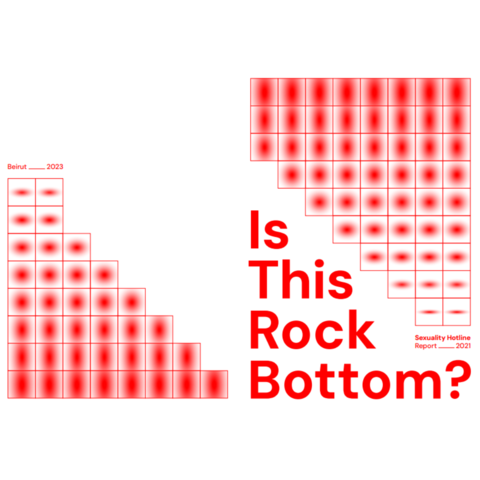IS THIS ROCK BOTTOM? Fifth Sexuality Hotline Report
This publication is the fifth edition of the sexuality hotline report. It offers an in-depth analysis of the data collected from calls made to the sexuality hotline in 2021 and contextualizes the data to the interlayered crises that continued to unfold in Lebanon that same year.
A total of 531 calls were made to the hotline between January and December 2021. Following the trend of previous years, calls this year have been mostly by people between ages 20-25, who are Lebanese, live in Beirut, and are cis women. New to this report is the emphasis placed on counsellors’ experiences and perspectives while volunteering on the hotline. Sharing counsellors’ viewpoints on how the crisis affected their roles and challenged their ability to offer counsel throughout the year offers a unique and humane perspective of the sexuality hotline counsellors. The inclusion of this perspective also introduces the sentiments of responsibility felt by counsellors when faced with calls on topics of financial need, housing, and food support.
Calls that discussed topics beyond sexuality, gender, and sexual and reproductive health and rights (SRHR) were an inevitable result of the all-encompassing economic crisis in Lebanon. Overall, we saw a total of 203 topics explored on the hotline this year. To better understand the context of these topics, all topics were reanalyzed into 29 major categories that showcase just how different and unique each call discussing a single topic may be. The most popular topics this year consisted of abortion, unwanted pregnancy, STIs, access to healthcare, and heteropatriarchy. New themes that emerged this year included affordable healthcare, access and availability of medications, housing support, and financial difficulties. These new topic themes reveal people’s overall consciousness towards the inaccessibility of healthcare and medication; reminding us that concerns of SRHR have only worsened amidst the crisis. This year’s findings also serve to remind us how difficult it can get to differentiate SRHR needs from non-SRHR needs in times where we are seeing and experiencing the direct effects of both on each other, in a way that makes the act of distinguishing concerns impractical. In other words, sexual and reproductive health concerns did not disappear amidst the other crises that emerged in 2021, but were rather exacerbated. The public need to reorient its attention to how basic needs, such as electricity and food provisions, worsen our sexual and reproductive wellbeing and make the availability of and access to healthcare services scarcer and of poorer quality
